Shiliuyun-Xinjiang Daily (Reporter Li Li) news: On October 30, 2023, the closing ceremony of the Visiting Program for Young Sinologists, which lasted for 21 days, was held in northwest China's Xinjiang Uygur Autonomous Region. 23 young sinologists from 21 countries including the United Arab Emirates, the Philippines, Germany, Argentina, Uzbekistan, etc., learned about the history and culture of China’s Xinjiang through study, discussions, and field visits, and personally experienced the economic and social development and the real life of people of all ethnic groups in Xinjiang.
"Impressive", "benefited a lot", "gained a lot", "seeing is believing", "It was a good opportunity for learning and exchange"... When it comes to the feelings of participating in this program, sinologists expressed their love for Xinjiang, their growing interest in Sinology, and their reluctant mood of parting with each other. And they are looking forward to visiting Xinjiang again.
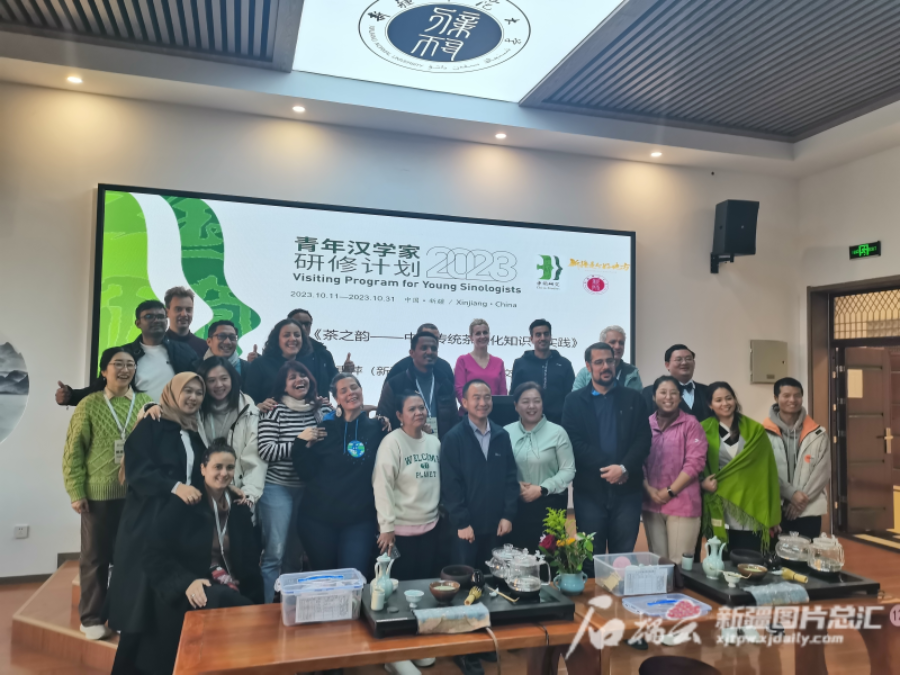
Photo shows a group photo of sinologists of the Visiting Program for Young Sinologists and a teacher who tought them tea art. (Photo by Shiliuyun-Xinjiang Daily/ Li Li)
It is always a pleasure to greet a friend from afar
This Visiting Program for Young Sinologists is hosted by the Ministry of Culture and Tourism, coordinated by the Sino Foreign Cultural Exchange Center and organized by the Department of Culture and Tourism of the Xinjiang Uygur Autonomous Region with Xinjiang Normal University’s assistance. Themed on studies on Belt and Road and national public goods, it adopted a training model that combines mentor guidance, academic lectures, and field visits.
During the program, 23 young sinologists listened to a number of academic lectures, conducted three weeks of thematic exchanges and discussions with experts and scholars, and visited Urumqi City, Kashgar Prefecture, Turpan City, etc., to investigate the construction achievements of the core area of the Silk Road Economic Belt in Xinjiang and the development history of the ancient Silk Road. They deeply felt the warm hospitality of people in Xinjiang.
"As an ancient poem goes, distance cannot divide true friends who feel close even if they are thousands of miles apart. I feel that I have a strong connection with Xinjiang," said Feri Ansori, director of the Chinese Department and Foreign Dean of the Confucius Institute at the University of Al Azhar, Indonesia. This was his second visit to Xinjiang. In 2015, he visited Xinjiang as an international student at Beijing Normal University. "Compared to what I saw eight years ago, Xinjiang has changed a lot with great development. In these three weeks, we witnessed the beautiful autumn in Xinjiang."
Feri said that he thoroughly enjoyed this training and learning experience. They learned about the history, ethnic groups, culture, and art of Xinjiang in the classroom, and visited the Xinjiang International Grand Bazaar, Kashgar University, Kashgar Museum, the old town of Kashgar, Fragrant Concubine Park, Xinjiang People's Theater, Xinjiang Museum, Xinjiang Art Museum, Xinjiang Agricultural Expo Park, Tianshan Tianchi Lake scenic area, Karez well, and Jiaohe ancient city, which gave them a deeper understanding of Xinjiang.
"I’m from Argentina, southeastern South America. I am now in Urumqi, northwest China’s Xinjiang, the hinterland of Asia.” Lucía Fernández, a teacher, translator and director of the Chinese Center of Catholic University of Salta in Argentina, showed the distance between Argentina and China with a world map.
It took Lucía Fernández nearly two days to arrive in Xinjiang by plane from Buenos Aires, Argentina, to Addis Ababa in Ethiopia, from Addis Ababa to Guangzhou and then from Guangzhou to Urumqi. "The distance between China and Argentina is more than 20,000 kilometers, but the beautiful natural scenery I have seen in Xinjiang and the kind people all made me feel like I am in my hometown."
"I would like to quote the Chinese philosopher Confucius, 'Isn't it a pleasure to study and practice what you have learned? Isn't it also great when friends visit from distant places? If one remains not annoyed when he is not understood by people around him, isn't he a sage?' We embrace the joy of learning, cherish the friendship we have established, and will continue to move forward with curiosity and humility," said Anna Rosario Malindog Uy, deputy director of the Asian Century Philippines Strategic Studies Institute, reflecting on the entire journey.
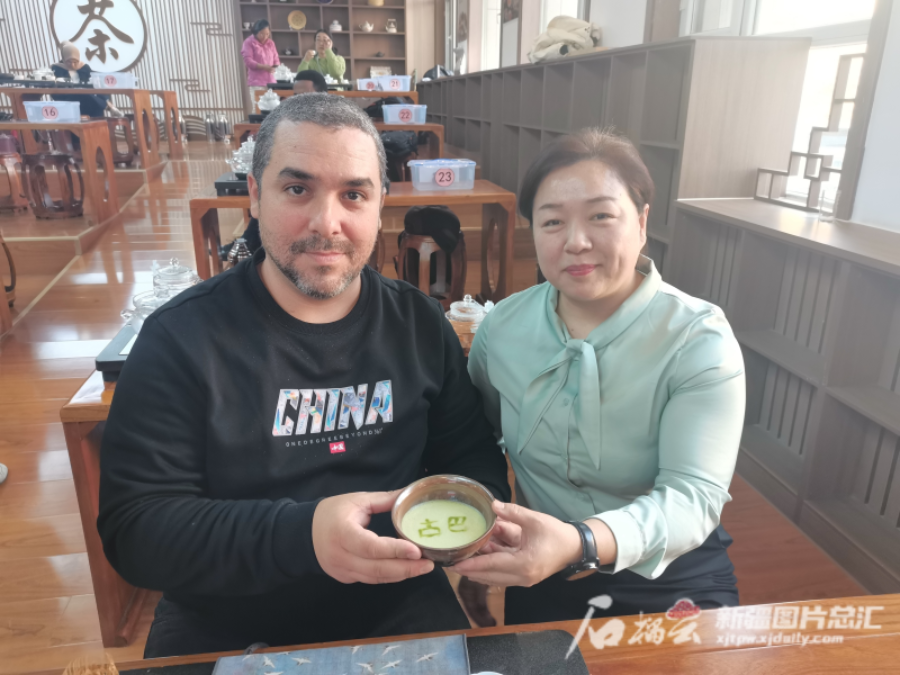
Photo shows sinologists of the Visiting Program for Young Sinologists experience creating tea art in cups (or dian cha in Chinese) at the tea art class. (Photo by Shiliuyun-Xinjiang Daily/ Li Li)
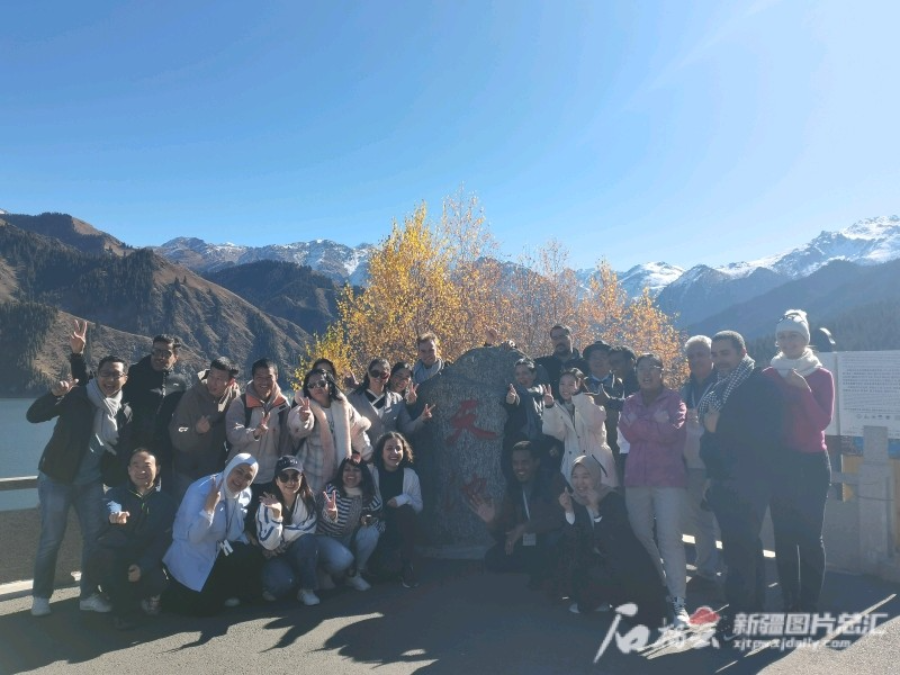
Photo shows a group photo of sinologists of the Visiting Program for Young Sinologists and a teacher who tought them tea art. (Photo by Shiliuyun-Xinjiang Daily/ Li Li)
Seeing is believing
"This visit has given me a glimpse into the daily lives of people in Urumqi, a beautiful city where different ethnic groups live in harmony, with rich cultural and natural heritage. As the largest city in the core area of the Silk Road Economic Belt, it has great potential for development," said Adane Kassie Bezabih, a researcher and policy analyst at the Federalism and Diversity Management Policy Research and Study Department. During his studies, he also saw the hard work, thirst for knowledge, and cooperative attitude of many excellent faculty members at Xinjiang Normal University. He learned that the university had set up scholarships for cultural exchange. "When I go back, I will recommend young and outstanding Ethiopian students to further study in this university."
Pusanti, director of education at the Indonesia Chinese Association, said that her 21-day firsthand experience made her look at Xinjiang with new eyes. "This is completely contrary to what I have seen and heard in some Western media. Xinjiang is very beautiful, safe and well-developed. We visited famous scenic spots and historical sites in Xinjiang, tasted local delicacies and communicated with local residents. These experiences have enriched my life experience and broadened my horizons."
Hamed Vafaei, a teacher in the Department of Chinese Language and Literature at the University of Tehran, believes that Xinjiang fully embodies the spirit of openness and inclusiveness of the Silk Road. From the cultural heritage of the old town of Kashgar to the beautiful jades in Hotan, from sweet pomegranates to crispy baked naan, one can feel the inclusiveness of this land. “This is a kind of spirit that is greatly needed in our world today, not only a prominent characteristic of Chinese civilization, but also a lesson that should be learned by all humanity worldwide.”
"The campuses are large and clean; the production process of Xinjiang Xiyuchun Dairy Co., Ltd. and Xinjiang Agricultural Expo Park is well-ordered with automation at an international level; the folk customs we have seen in Xinjiang International Grand Bazaar and old town of Kashgar are colorful; the blue sky, snow-capped mountains, clear water, and singing birds in Tianshan Tianchi scenic area are breathtaking; there are dapanji (big plate chicken), lamb kebab, samosa (a roasted stuffed bun) and all kinds of fruits... Xinjiang is too fascinating, far beyond my imagination," said Sugawara Naoko, a translator and Chinese language teacher of The Duan Press.
Rich and exciting knowledge lectures, tea art, paper cutting, painting, calligraphy, martial arts, ethnic dance, Chinese knotting and other characteristic cultural experience classes, also made the students feel interested and fulfilled.
"Being able to participate in this program in Xinjiang, the core area of the Belt and Road Initiative and a place of diverse cultural exchanges since ancient times, is my wealth for a lifetime,"Sugawara Naoko said that after returning to Japan, she will spread what she has seen and heard about China's Xinjiang to people.
"Xinjiang is a prosperous and harmonious place, with a promising future,” Lina Maria Luna Beltran, dean of the School of International Relations at the Universidad Externado de Colombia, said.

Photo shows sinologists of the Visiting Program for Young Sinologists, staff members of the Gulandam Ili Centennial Handmade Ice Cream Shop and locals take a group photo in front of the Xinjiang People's Theater in Urumqi, northwest China's Xinjiang Uygur Autonomous Region. (Photo by Shiliuyun-Xinjiang Daily/ Li Li)
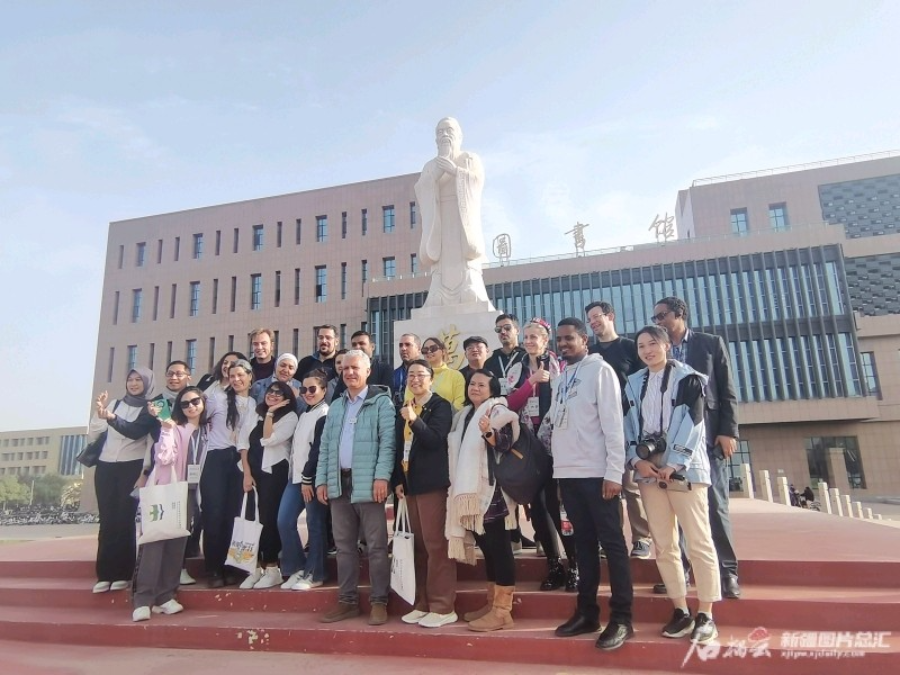
Photo shows sinologists of the Visiting Program for Young Sinologists take a group photo in front of the library of the Xinquan Campus of Kashgar University in Kashgar Prefecture, northwest China's Xinjiang Uygur Autonomous Region. (Photo by Shiliuyun-Xinjiang Daily/ Li Li)
A bosom friend afar brings a distant land near
"Civilization becomes more colorful through exchanges, and grows better through mutual learning." During their study and investigation, the 23 young sinologists gained not only rich knowledge, but also profound friendships across countries.
“Sinology is not just about studying the history of China, but also about engaging in a dialogue with China's present and future. The whole process of study is about the connections between the East and the West, between ancient wisdom and modern insight, and among each of us cross-cultural learners." Anna Rosario Malindog Uy believes that as messengers of cultural communication, sinologists should conduct more research on Chinese initiatives and ideas, interpret them well, and promote mutual learning and mutual benefit.
The participants of the program come from 21 countries around the world. Lim Kah Hoe, executive director of the Malaysian Chinese Museum, said, "Some of these countries are even countries I never thought would have an interaction, and through this study program, they became my 'Adaxi' ("friend" in ethnic Uygur language), which is part of the beauty of Xinjiang in my heart."
"During this study program, I have learned a lot," said Lucía Fernández. "The students in the program are like family members with various characteristics. But we all share the same passion."
"There is a classical Chinese poem that goes, 'A bosom friend afar brings a distant land near.' Friends who understand each other are like close neighbors even if they are far apart. Friendship is not limited by time or distance." Lucía Fernández said that China’s Xinjiang and Argentina are both nice places. He hopes that there will be more exchanges and cooperation between the two places in the future.
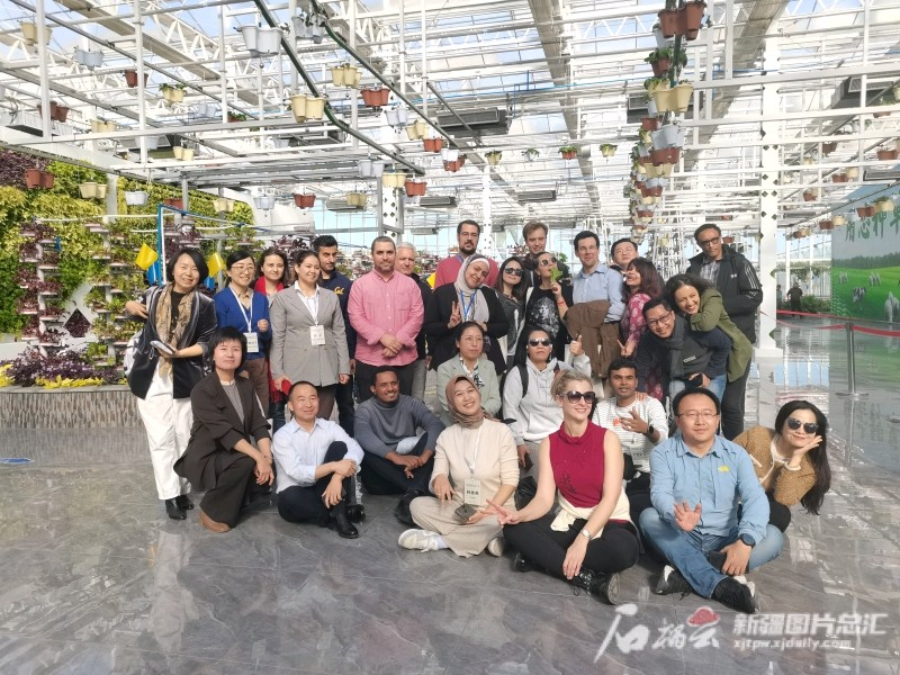
Photo shows sinologists of the Visiting Program for Young Sinologists take a group photo in the Xinjiang Agricultural Expo Park in Changji Hui Autonomous Prefecture, northwest China's Xinjiang Uygur Autonomous Region. (Photo by Shiliuyun-Xinjiang Daily/ Li Li)
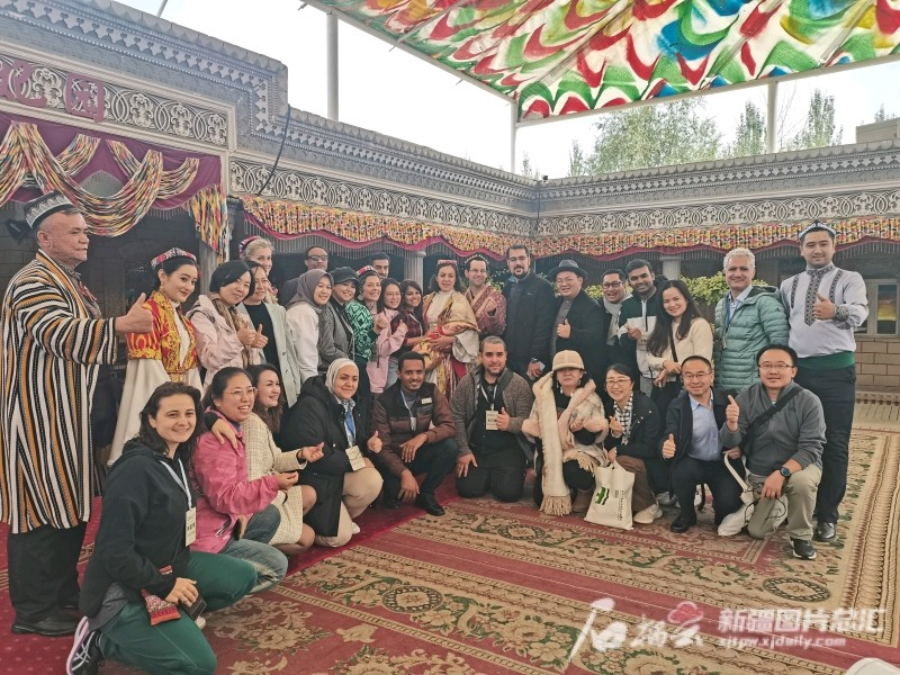
Photo shows sinologists of the Visiting Program for Young Sinologists, actors, and tourists take a group photo in Fragrant Concubine Park in Kashgar Prefecture, northwest China's Xinjiang Uygur Autonomous Region. (Photo by Shiliuyun-Xinjiang Daily/ Li Li)
"I have noticed that people are using mobile payment systems in various conditions like shopping, taking taxis, and even in markets along the streets. This shows the high level of the Chinese digital economy," said Dareskedar Taye Mengist, director of the Asia-Pacific Affairs Research Directorate of the Institute of Foreign Affairs. He expressed his intention to join a Confucius Institute after returning to his country to better learn Chinese.
The deputy secretary of the Party committee and president of Xinjiang Normal University, Umarjan Ali, introduced that this study program included a total of three special lectures and twelve special courses. The content covers various aspects such as economic development, employment, law, education, history, archaeology, religion, intangible cultural heritage, folk customs, tourism, literature, music, dance, fine arts, film in the core area of Belt and Road Initiative; six guidance on paper (report) writing; 16 activities to experience and practice Chinese culture; more than 20 visits to places like Urumqi, Changji Hui Autonomous Prefecture, Kashgar Prefecture, Turpan City, etc. “Many students have become friends with teachers and students of Xinjiang Normal University and built bridges for further exchanges and cooperation in the future.”
The secretary of the Party group and deputy director of the Department of Culture and Tourism of the Xinjiang Uygur Autonomous Region, Xu Ruijun, believes that it is of great significance that the Visiting Program for Young Sinologists was held in Xinjiang this year, and themed on studies on Belt and Road and national public goods. "This is a platform for young talents in the field of Sinology from various countries to come to China for academic exchanges and cooperation. It also provides us with a valuable opportunity to show the real and objective image of China’s Xinjiang to the world." Xu Ruijun said, "Xinjiang is a nice place. We hope that they can introduce what they have seen and heard during their studies and research in Xinjiang to more people, so that more knowledgeable people in the international community can understand the real Xinjiang comprehensively and objectively. We sincerely invite sinologists to come to Xinjiang for academic research in the future, continue to care about and pay attention to Xinjiang, strengthen contacts with Xinjiang. And we hope that they can play an active role in deepening exchanges between China and thier home countries and telling good stories about China’s Xinjiang."
(A written permission shall be obtained for reprinting, excerpting, copying and mirroring of the contents published on this website. Unauthorized aforementioned act shall be deemed an infringement, of which the actor shall be held accountable under the law.)









